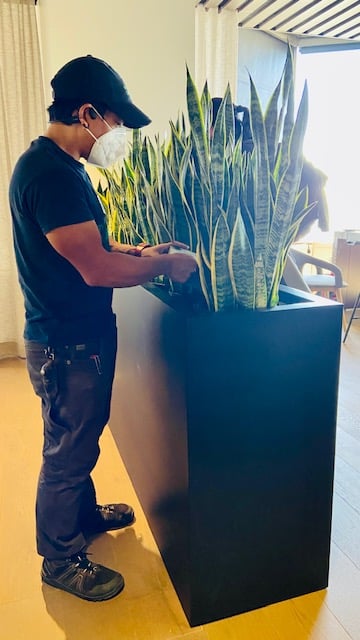Plants bring vibrancy, health benefits, and a professional touch to offices and commercial spaces. Yet, keeping them looking their best requires more than just occasional watering. A full-service plant maintenance program is designed to provide comprehensive care that extends well beyond basic upkeep. Businesses that invest in such programs benefit from thriving greenery, enhanced aesthetics, and long-term savings on plant replacement costs.
Understanding what “full-service” means helps office managers and property owners evaluate whether their current program provides enough value. By looking closely at the services included, it becomes clear why comprehensive support is critical for plant success.
Beyond Basic Watering
At its most minimal, plant care often centers on watering. However, full-service plant maintenance encompasses much more. Each plant species has unique requirements that change with the seasons, lighting, and indoor climate.
Elements that go beyond simple watering include:
- Nutrient management: Plants require fertilizers tailored to their type and growing conditions.
- Pest monitoring: Inspections prevent issues with insects that often target indoor greenery.
- Pruning and grooming: Removing dead leaves and shaping plants keeps them attractive and healthy.
- Soil care: Periodic replacement or refreshing of soil ensures root systems remain strong.
- Moisture balance: Careful attention prevents overwatering, a common cause of plant failure.
Programs that address all these details provide far better results than those focused solely on hydration. Many office managers also find that scheduling care, whether weekly or biweekly, plays a key role in plant success.
Customized Care for Every Space
No two office environments are alike, and a one-size-fits-all program is rarely effective. A full-service approach means evaluating the unique conditions of each space and adjusting care accordingly.
Factors that influence customized plant maintenance include:
- Lighting conditions: Natural light varies greatly between offices, and some plants require artificial supplementation.
- Climate control systems: Air conditioning or heating can dry out plants if adjustments are not made.
- Space usage: Plants in lobbies, conference rooms, or workstations each face different exposure levels.
- Species selection: The right plants for one office may not thrive in another environment.
- Traffic levels: High-traffic spaces need durable plants that can withstand disturbance.
Full-service programs also consider aesthetics, ensuring that plant arrangements align with design goals. For example, modern offices may favor sleek, minimalist greenery, while more traditional spaces may require lush, decorative plants.
Regular Monitoring and Preventive Action
Even healthy plants require regular monitoring to prevent problems from developing. A full-service program includes inspections that catch early signs of stress before plants decline beyond recovery.
Preventive measures usually cover:
- Pest inspections: Early detection prevents infestations from spreading.
- Disease identification: Spotting fungal or bacterial issues ensures timely treatment.
- Soil moisture checks: Tools and expertise allow for accurate adjustments to watering routines.
- Nutrient balance tests: Fertilizers are applied only when necessary to avoid plant stress.
- Plant rotation: Moving plants between spaces can help balance light exposure.
This kind of proactive approach not only improves plant health but also reduces the costs of replacing greenery. Office managers who follow a plant care schedule are more likely to keep plants thriving year-round, with fewer unexpected issues.
Enhancing Workplace Aesthetics and Wellbeing
A full-service plant maintenance program does more than sustain greenery. It plays a key role in shaping the atmosphere of a workplace. Healthy, well-cared-for plants support both visual appeal and overall wellness for employees and visitors.
Key benefits for businesses include:
- Improved air quality: Plants naturally filter pollutants and add humidity to dry indoor environments.
- Reduced stress: Greenery contributes to calmer, more inviting workspaces.
- Enhanced branding: A polished office with thriving plants reflects professionalism and attention to detail.
- Employee satisfaction: Workers feel more valued in a pleasant, well-maintained environment.
- Visitor impressions: Clients and guests notice when a space feels fresh and well cared for.
These benefits highlight why full-service programs are about more than maintenance; they are investments in workplace culture and productivity.
Why Professional Expertise Matters
While some businesses attempt to handle plant care in-house, full-service programs delivered by professionals ensure long-term success. Trained technicians understand the complex needs of different plant species, environmental conditions, and design goals.
Advantages of professional support include:
- Consistent results: Plants remain attractive and healthy year-round.
- Specialized knowledge: Technicians recognize and address issues before they escalate.
- Tailored solutions: Care is adjusted to match each unique property.
- Time savings: Staff can focus on their work rather than managing plants.
- Cost efficiency: Preventive care reduces plant replacement expenses.
By entrusting professionals with plant maintenance, businesses gain peace of mind knowing their greenery will enhance rather than detract from the workspace.
Let Experts Care for Your Greenery
Creating a thriving office environment takes more than placing a few plants around the room. A full-service plant maintenance program ensures every detail is covered, from watering to pest control and long-term design. For dependable, tailored care that keeps your greenery flourishing, contact The Wright Gardner today and experience the difference expert support provides.

